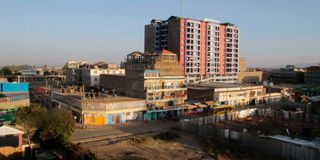Nanyuki totters as new British Army rules bite

A view of Nanyuki town.
For much of Nanyuki’s business community, memories of the good old days linger; when the arrival of British Army soldiers for training heralded a windfall.
The more than 1,000 soldiers were allowed to mingle freely with the locals for days after their training, providing an opportunity for traders, hoteliers, taxi drivers, curio dealers and commercial sex workers to make a killing.
But that was then. Things took a nosedive after the troops, under the command of the British Army Training Unit in Kenya (Batuk), were restricted in their movements, with only a few allowed to venture out after completing their six-week training.

British Army soldiers board a military truck after a battle group exercise during a media engagement at the Lolldaiga training area in Laikipia County on November 14, 2022.
The number of entertainment venues the soldiers can visit is limited and closely monitored by their seniors, leaving little room for local interaction.
While the new restrictions may have been well-intentioned following some ugly incidents in the past, including the still unsolved murder of Agnes Wanjiru while partying with the soldiers in 2012, suppliers of goods and services decry the move, describing it as punitive.
“With no manufacturing industry in Nanyuki town after the collapse of Mount Kenya Textiles, Batuk was the main driver of the economy here until a few years ago. The problem lies in the confinement of soldiers at Nyati Barracks before and after field training,” says Mr Daniel Ndiritu, a taxi driver.
Mr Ndiritu, who works near the barracks, recalls that he used to make up to Sh15,000 a day when the troops were in Nanyuki town, but now he barely makes Sh4,000 a day.

British Army soldiers board a military truck after a battle group exercise during a media engagement at the Lolldaiga training area in Laikipia County on November 14, 2022.
“Things seem to be going from bad to worse for us in the transport sector. Even car rental services are being outsourced from other counties when we, as the host county, should be given priority,” says the elderly taxi operator.
His views are shared by curio shop owner David Mulinge, who has been in business in the town for 40 years.
“I remember and miss the good days when foreign troops swarmed the town and literally raided the various entertainment venues. I had set up a shop at the Sportsman's Arms Hotel and I remember selling Sh200,000 worth of carvings one day,” says Mr Mulinge.
The trader attributes the dwindling fortunes to restrictions on the movement of soldiers. “Out of more than 1,000 soldiers, less than 100 are allowed into the town for a short time and if you are lucky, you can sell about Sh5,000,” says Mr Mulinge, the chairman of LAB East curio dealers.

Britain’s Foreign Secretary Boris Johnson (centre) talks to soldiers at the British Training Unit Kenya, popularly known as BATUK, in Ole Naishu, Nanyuki, on March 17, 2017.
Mr Ndegwa Gitonga, the Nanyuki chapter chairman of the National Chamber of Commerce and Industry, agrees that there is stiff competition to share the Batuk cake.
“It is true that soon after a training exercise, soldiers are taken for what they call adventure to areas outside Laikipia such as Sagana in Kirinyaga County, Naivasha and the South Coast where they spend a lot of money. Local traders are not benefiting as much as they used to,” he says.
Mr Gitonga notes that most of the goods used by the soldiers are also sourced from outside the county, including milk and vegetables. “CSR [Corporate Social Responsibility] is not enough; the locals need to earn through trade and investment, as they did a few years ago,” he says.
Every year, Batuk spends millions of shillings to support community services such as water supply, education, health and road infrastructure.
The unit’s commander Duncan Mann said at a recent media briefing that Batuk spends Sh50 million every year to support education in Laikipia, Isiolo and Samburu counties, the areas where the soldiers train.
More than 1,000 people are also employed by Batuk, half of them on a casual basis and the rest on permanent terms at Nyati Barracks.
Built about five years ago at a cost of US$70 million and located near Laikipia Air Base, Nyati Barracks is now the nerve centre of Batuk after the headquarters was moved from Kahawa Barracks in Nairobi.
With this heavy investment, the local community feels they are getting a raw deal. “A few years ago, commercial sex workers experienced a boom whenever soldiers completed their field training and returned to the barracks,” recalls Ms Maryanne Wangui, spokesperson for the Nanyuki Sex Workers Association.

A view of one of Nanyuki's busy streets that is normally frequented by commercial sex workers at night. Movement restrictions imposed on the foreign troops have resulted in declining fortunes for the traders and investors.
Contacted, Batuk said it remains a major contributor to the economy of Nanyuki town and Laikipia County in general, revealing that a total of Sh6 billion has been spent since 2016 through wages and salaries and procurement of goods and services.
“We have over 600 permanent staff and over 1,800 casual workers are employed for an average of eight weeks per year, in addition to spending money locally on goods and services,” reads part of Batuk’s response.
The statement did not indicate when the policy of restricting the movement of soldiers came into effect, but only explained why it was a necessary step. “For security reasons, Batuk personnel are required to keep the unit informed of their whereabouts at all times and to avoid certain establishments where illegal activities such as drug dealing and prostitution are known to take place,” the statement adds.





